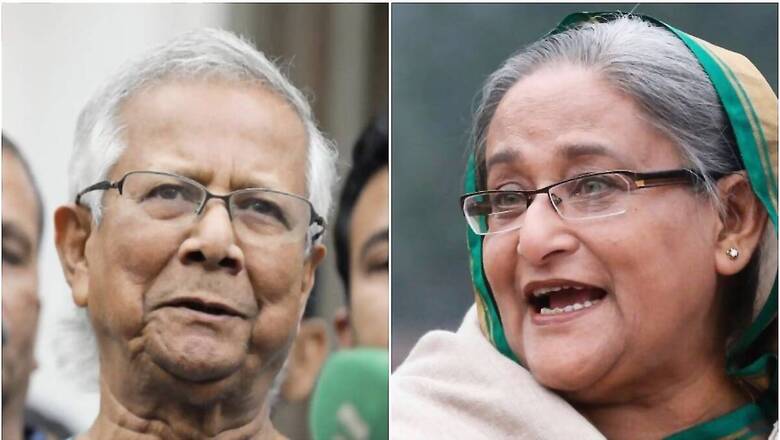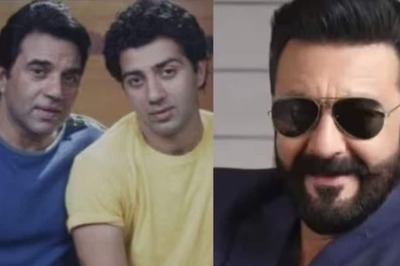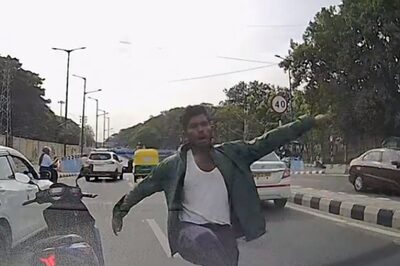
views
At times, in the first few days of any geopolitical crisis, I must admit that the situation often looks ominous and unresolvable. However, geopolitical crises generally carry the inherent danger of affecting national security. Therefore, any delay on the part of policymakers in correctly comprehending a crisis situation can be fraught with danger. Transparency and clarity seldom emerge easily, especially if one tries too hard to connect the dots. The problem with an issue such as the crisis in Bangladesh is that there are simply too many unconnected dots. You connect several, and then more appear in different directions.
Secondly, there are a few core beliefs that come from observing trends over time. However, during times like these, most of these trends take a back seat, and core assumptions can start to go awry. As events unfold, each must be examined and analysed based on credibility and without the bias of core beliefs. This is a difficult task, in fact, a challenge.
There are a couple of prime issues concerning the Bangladesh crisis. However, I recognise that as we move forward, many of these issues will change. The first striking observation is that the majority of people in Bangladesh, including respected senior functionaries, intellectuals, former civil servants, and analysts, are convinced that what has happened is for the good of Bangladesh. However, one wonders whether the economic and social progress Bangladesh made in the last 15 years under Sheikh Hasina was not a factor in her favour or that of her party, the Awami League.
Friends from Bangladesh who urge us to respect and understand the aspirations of the people often argue that such progress, without the freedom to choose their representatives, is not true progress. In other words, the desire for democratic empowerment has been very strong, and the Sheikh Hasina government has completely ignored this through the conduct of non-participatory elections and a hard-nosed attitude that brooked very little opposition. Perhaps many of us got this wrong too.
Secondly, the same people also tell us that while India supported the government, it never scrutinised what was transpiring within the nation under the rulers. In other words, the argument about India stretches back more than 50 years and suggests that it has never understood the people or attempted to establish a transformational link that could then permeate into a people-to-people understanding. Obviously, many of these individuals exhibited the same attitude before the downfall of the Sheikh Hasina government, but they voiced their concerns quietly, and such quietly voiced concerns are rarely heard.
Clearly, a lot of reality seems to be dawning on many of us. Yet, it is difficult to take sides, even now. What no one in Bangladesh wants to hear is that India must act according to its long-term strategic interests. These interests demand that we have the capability to cooperate and work with any government in power in Bangladesh, preferably one elected by a popular vote. The dilemma arises when there is a situation involving a friendly and effective government that does not meet the approval of the people.
The third point conveyed to me, and I believe it is the most important issue, is that Indians and India seem to view Bangladesh and its people through the prism of the 1971 crisis, which led to the Indo-Pak War, the defeat of the Pakistani Army, and the surrender of 93,000 prisoners of war. For a long time, this issue has rankled the self-esteem of Bangladesh. Deep down, it is well-known that India sacrificed its soldiers to secure Bangladesh’s independence. In India, we often believe that the Bangladeshi people, across all segments, are only transactionally grateful for this act by India. If you step back and examine this, a certain truth does emerge.
We never had a single Bangladeshi representative in the iconic photograph of the surrender at the Maidan in Dhaka. No one thought of this at the time, and that half a century later, it would be a contributing factor to a certain angst against India. In reality, there was no established Bangladesh Army at that point, and Colonel Osmany, the senior-most officer, was in Kolkata; his presence no doubt could have been symbolic. But that is history.
Our perception was that India acted rather magnanimously by ensuring we withdrew our forces as soon as possible, transporting the 93,000 Pakistani prisoners of war to India and bearing the entire cost of the logistics while they remained in our custody. We also assisted in setting up many of the institutions that helped Bangladesh quickly get on its feet as an independent nation. In recent years, Indians have often praised and complimented the Bangladeshi government for lifting 25 million people out of poverty and building the economy to $450 billion, with an annual $60 billion apparel export industry. Yet, somewhere along the way, the perception did not align, and our communication of these positives was taken as condescension, which is unfortunate.
That is why it’s difficult to absorb all the visuals that emerged from Bangladesh last week: the burning of the Indira Gandhi Cultural Centre and temples, and worst of all, the targeting of the Hindu minority. The toppling and desecration of Sheikh Mujibur Rahman’s statue symbolised the anger in the streets.
I felt that the Bangladesh Army could have anticipated the threat to institutions once the situation reached a critical point. It is usually difficult to make such an assessment, but that is precisely what intelligence agencies are meant to do. The leeway given to mobs to desecrate the Parliament, Indian-sponsored institutions, and the PM’s residence could have been mitigated with some pre-emption. I have served with the Bangladesh Army in two UN missions and spoken at its various training institutions in Dhaka. I consider it to be a very professional force, and its neutrality and professionalism should ensure the stability of Bangladesh during these challenging times.
The Indian Armed Forces and the Bangladesh Armed Forces enjoy a special relationship and should regard 1971 as a joint heritage that enhanced their splendid records. There is some speculation in India among certain circles that the symbols of the joint victory have been desecrated, signifying the end of this special linkage. However, this is not true, as the events of the last few weeks reflect a frustrated and angry youth. They need to be placated by the Bangladesh Army through outreach, demonstrating that India and its Armed Forces continue to support Bangladesh’s democracy, which will empower the people.
The potential threat hanging over the Indo-Bangladesh relationship relates to the degree of control and penetration that religious radicals have achieved in the national polity. There was a time when ISIS considered Bangladesh to be a highly viable society for proliferation due to the significant level of radicalism present in 2015. The Islamists, with their heritage tracing back to 1971, when they opposed Bengali intellectuals, were targeted by Sheikh Hasina, who ensured they held no position of influence. However, the situation may now be different, as the current rulers appear to be employing a softer strategy to prevent any backlash.
In the many demonstrations on the streets, the presence of Jamaat-e-Islami has been notable, and the initial targeting of the Hindu minority community has likely been instigated by them. The new government has taken steps to address the potential targeting of minorities, which is a bold and positive move.
India will need to navigate this situation carefully. A good interlocutor, preferably a veteran Indian diplomat with experience in Dhaka, could facilitate the establishment of a renewed relationship. Bangladesh’s economy cannot be allowed to falter, as this presents an opportunity for significant Indo-Bangladesh cooperation. At the same time, India’s genuine security interests must also be addressed, ensuring that militants from the Northeast are not allowed a foothold in Bangladesh.
Lastly, let India and Bangladesh make it clear to major powers and the strategic community at large that they are unwilling to be manipulated. They should demonstrate that they will mutually safeguard each other’s security interests in the face of any attempts by external powers to exert influence in the region.
The writer is a former GOC of the Srinagar-based 15 Corps and Chancellor, Central University of Kashmir. Views expressed in the above piece are personal and solely that of the author. They do not necessarily reflect News18’s views.




















Comments
0 comment